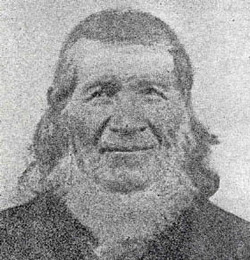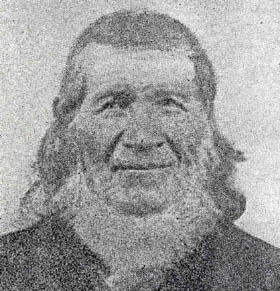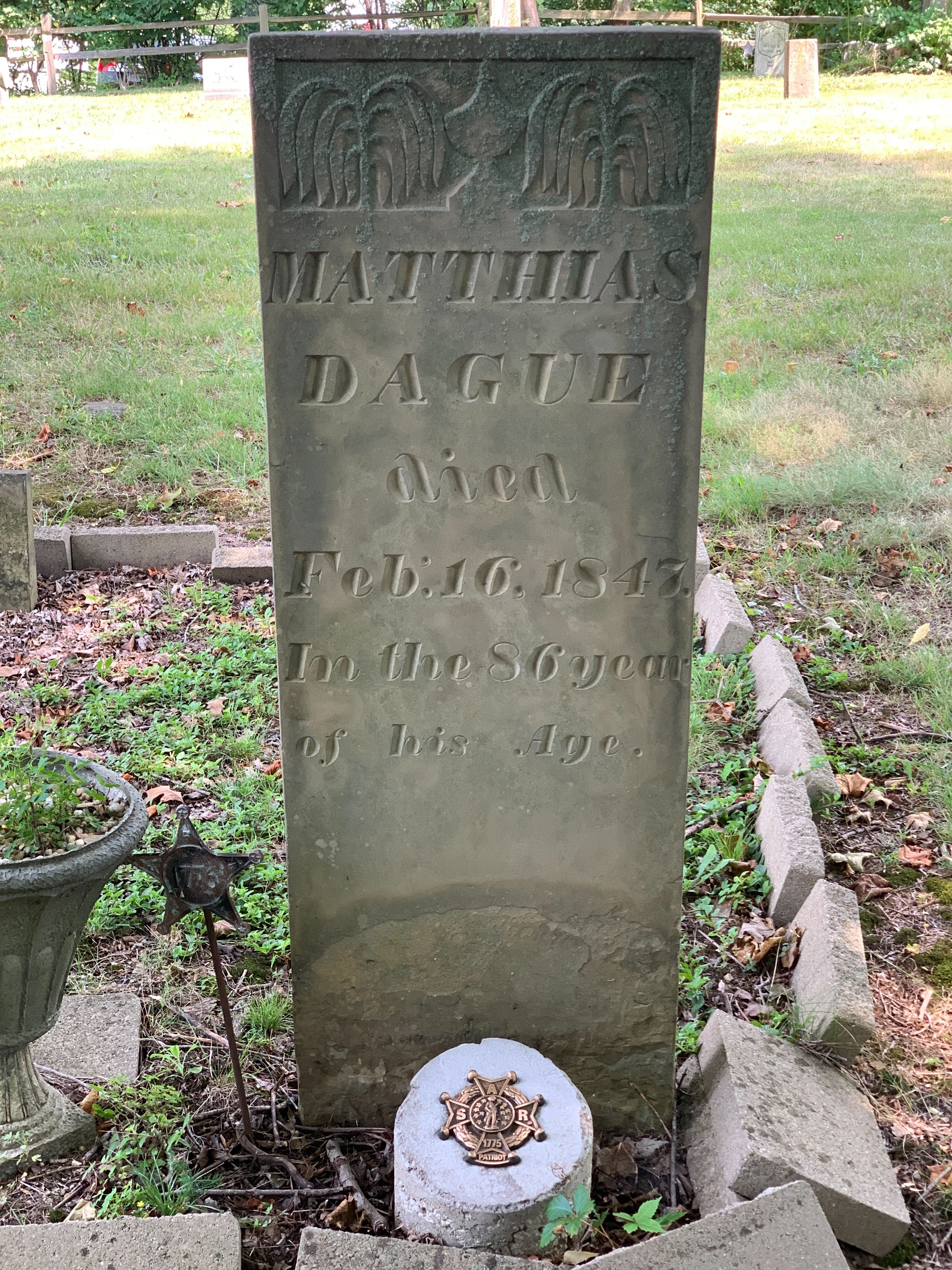As a farmer, Mathias resided on Ten Mile Creek, West Bethlehem Township, Washington County, PA, and attended Bethlehem Evangelical Lutheran Church.
By 1802, he had moved to the southwest part of Plain Township, Franklin County, OH, where he was appointed commissioner of Franklin County.
DAGUE Biographies from "One Hundred Years History of Mifflin Presbytarian Church, Gahanna, Franklin Co., OH", by Donald W. MacLeond. 1941:
"The Dagues came from Europe during the 17th century and settled in Lancaster Co., Pa. From there in 1810, three Dague brothers, Mathias, David, and George, emigrated to Ohio and settled in Plain Township in Franklin Co. It took men of courageous spirit to come at that time into this region and to settle in the heart of an unbroken wilderness. When the Dagues settled in Plain township, there was only one white settler between them and Alum Creek, namely, Mathias Ridenour, who two years previous to their coming had settled in Cherry Bottom. At the time, the land was covered with heavy timber. Danger lurked on every side. The air was infected with malaria. Rattle snakes and Copper heads were numerous. Bears and panthers roamed through the timberland. The story has been handed down that when the Dagues built their first cabins, packs of wolves, the most dreaded of all the beasts of the forest, used to come to their cabin doors and rendered the night hideous with their howlings. There were also Indians in the vicinity, who, although seemingly friendly, were a source of alarm, because they were not to be trusted, and might any moment start on the war path. Jonathon Dague, a son of George Dague, who was born in 1814, stated that when he was a small boy, there was a tribe of Indians near his father's farm under the leadership of three chiefs, namely, Long John, Indian Joe, and Big Tree. Such were the hazardous conditions, calling for tact, courage, and resourcefulness under which the three Dague brothers and their descendants founded the Dague community of Plain Township. Mathias had several sons, one of whom was Peter, the grandfather of Elmer Dague of Gahanna. Daniel also was the father of several children, one of whom was George. George was the father of Jonathon and Edmund. Jonathon was the father of Eva Dague who united with the Mifflin Church in 1888, and of Fannie Dague who was married to Samuel Earl, and was the mother of Walter Earl. Edmund and Sarah Cook Dague had a family of four children, namely, Daniel, Rose Ella, William, the father of Noah Dague of Gahanna; and Sara Jane, the wife of Jacob Breinig and the mother of Mrs. William Sandusky, Mrs. David Stygler and Mrs. S.C. Stone. Daniel Dague settled on Rocky Fork, built a large log house on the site of the home now owned by Att'y Carl Benbow. The old log house in early pioneer days served as a dwelling house, a tavern, and a church. Across the road from the site is a small cemetery owned and kept in excellent condition by Mr. Noah Dague. There reposes the dust of the Dague pioneers and their descendants who redeemed Plain township from its virgin forest and made it one of the most attractive and prosperous communities in Franklin Co."
In 1833, he received a pension for his Revolutionary War Service.
Mathias was the son of Johann Friedrich Dague (Deg, Deeg, Tague) and Anna Maria Geysler. Mathias married Elizabeth ___. Their children: George, Mathias, John, Anna Marie, unknown son, Elizabeth Clouse Rodgers, Daniel, and Susana Huffman.
As a farmer, Mathias resided on Ten Mile Creek, West Bethlehem Township, Washington County, PA, and attended Bethlehem Evangelical Lutheran Church.
By 1802, he had moved to the southwest part of Plain Township, Franklin County, OH, where he was appointed commissioner of Franklin County.
DAGUE Biographies from "One Hundred Years History of Mifflin Presbytarian Church, Gahanna, Franklin Co., OH", by Donald W. MacLeond. 1941:
"The Dagues came from Europe during the 17th century and settled in Lancaster Co., Pa. From there in 1810, three Dague brothers, Mathias, David, and George, emigrated to Ohio and settled in Plain Township in Franklin Co. It took men of courageous spirit to come at that time into this region and to settle in the heart of an unbroken wilderness. When the Dagues settled in Plain township, there was only one white settler between them and Alum Creek, namely, Mathias Ridenour, who two years previous to their coming had settled in Cherry Bottom. At the time, the land was covered with heavy timber. Danger lurked on every side. The air was infected with malaria. Rattle snakes and Copper heads were numerous. Bears and panthers roamed through the timberland. The story has been handed down that when the Dagues built their first cabins, packs of wolves, the most dreaded of all the beasts of the forest, used to come to their cabin doors and rendered the night hideous with their howlings. There were also Indians in the vicinity, who, although seemingly friendly, were a source of alarm, because they were not to be trusted, and might any moment start on the war path. Jonathon Dague, a son of George Dague, who was born in 1814, stated that when he was a small boy, there was a tribe of Indians near his father's farm under the leadership of three chiefs, namely, Long John, Indian Joe, and Big Tree. Such were the hazardous conditions, calling for tact, courage, and resourcefulness under which the three Dague brothers and their descendants founded the Dague community of Plain Township. Mathias had several sons, one of whom was Peter, the grandfather of Elmer Dague of Gahanna. Daniel also was the father of several children, one of whom was George. George was the father of Jonathon and Edmund. Jonathon was the father of Eva Dague who united with the Mifflin Church in 1888, and of Fannie Dague who was married to Samuel Earl, and was the mother of Walter Earl. Edmund and Sarah Cook Dague had a family of four children, namely, Daniel, Rose Ella, William, the father of Noah Dague of Gahanna; and Sara Jane, the wife of Jacob Breinig and the mother of Mrs. William Sandusky, Mrs. David Stygler and Mrs. S.C. Stone. Daniel Dague settled on Rocky Fork, built a large log house on the site of the home now owned by Att'y Carl Benbow. The old log house in early pioneer days served as a dwelling house, a tavern, and a church. Across the road from the site is a small cemetery owned and kept in excellent condition by Mr. Noah Dague. There reposes the dust of the Dague pioneers and their descendants who redeemed Plain township from its virgin forest and made it one of the most attractive and prosperous communities in Franklin Co."
In 1833, he received a pension for his Revolutionary War Service.
Mathias was the son of Johann Friedrich Dague (Deg, Deeg, Tague) and Anna Maria Geysler. Mathias married Elizabeth ___. Their children: George, Mathias, John, Anna Marie, unknown son, Elizabeth Clouse Rodgers, Daniel, and Susana Huffman.















